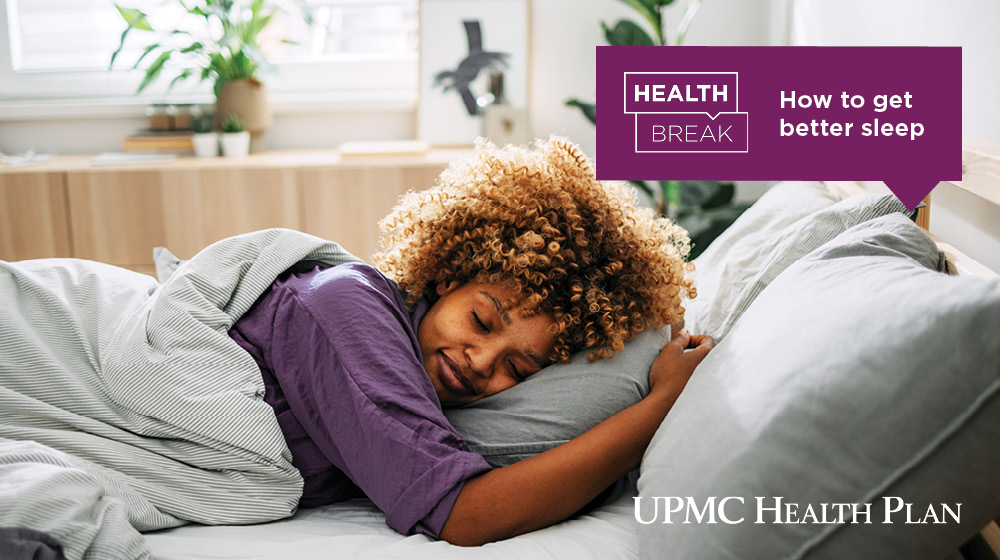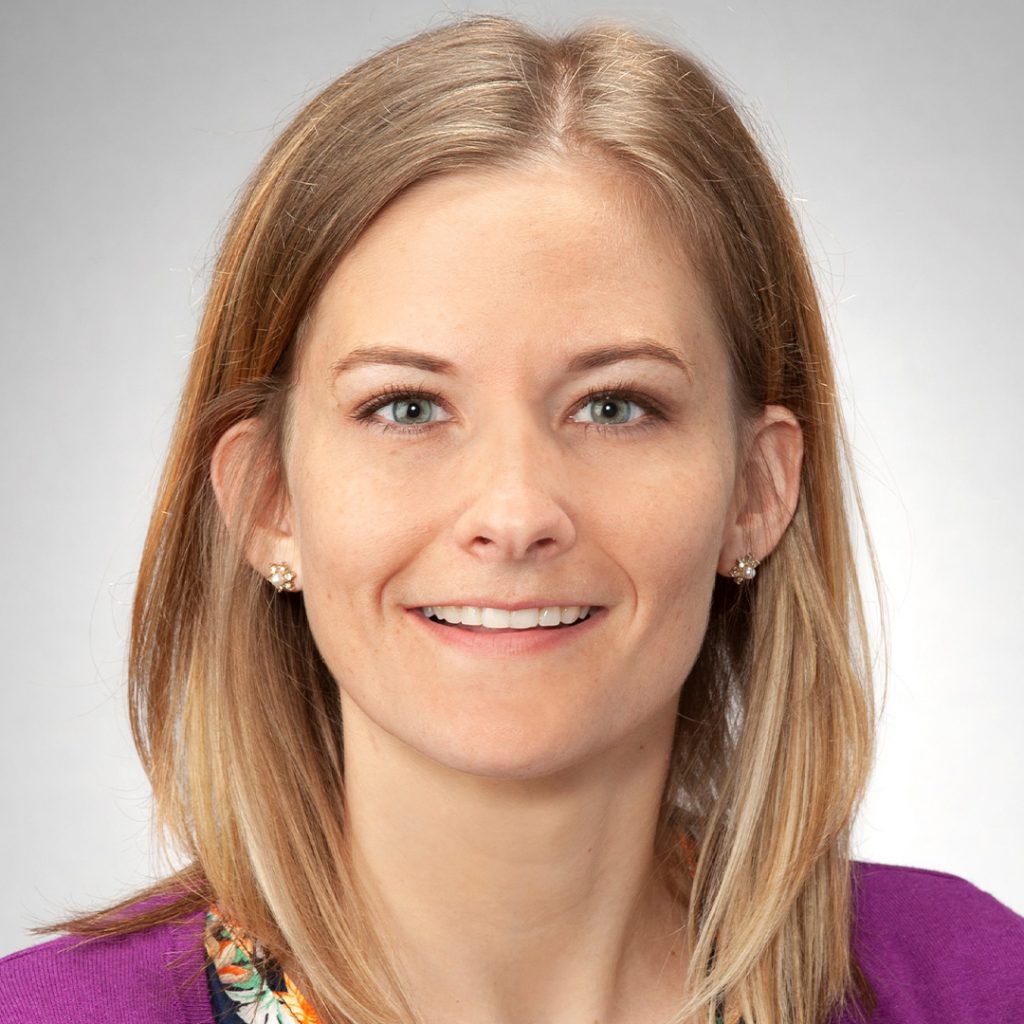Health Break: How to get better sleep

A podcast for UPMC Health Plan members, Health Break is your quick guide to caring for your mental and physical health, prioritizing wellness, and making the most of your health insurance plan.
Episode 25: Take a Health Break with Alex Treanor
Alex takes a Health Break to talk with us about sleep—and why we’re probably doing it wrong. Tune in to learn about sleep hygiene and why it’s key for your health.
Episode transcript:
Camille: Welcome to Health Break by UPMC Health Plan, your quick guide to health, wellness, and how to make the most of your health insurance plan. I’m your host, Dr. Camille Clarke-Smith. I help to oversee the quality of the plans and programs we offer at UPMC Health Plan.
Angelo: And I’m your co-host, Angelo Bartic. I’m a health coach who works with our members on making healthy lifestyle habits and setting goals. This is your…Health Break.
Camille: It’s Dr. Camille Clarke-Smith here, and today we’re joined again by my Health Break season 1 co-host Alex Treanor. And today she’ll be telling us how to crack the code on sleep hygiene: how to fall asleep, stay asleep, get restful sleep, and practice the right sleep habits to support your overall wellness.
Thank you so much, Alex, for being here today.
Alex: Thank you so much for having me today.
Camille: So, in preparation for this podcast, we surveyed members to find out the topics they’re most interested in learning about, and how to get better sleep was at the top of the list.
Alex: That’s awesome; I’m actually really excited to hear that. Sleep often gets pushed to the bottom of the list, so I’m glad people are interested in it.
Camille: So, we’re hearing about this term sleep hygiene. What is it?
Alex: Yeah, sleep hygiene can be this ambiguous term. There’s a lot that goes into it. It’s hard to know exactly how do we define it? The sleep foundation actually breaks sleep hygiene down into two different sections. First one is going to be that sleeping environment. This is going to be the physical aspect of how you set up your environment to be conducive to sleep. You want it to be dark, cool, quiet, comfortable, even get rid of any electronics if possible. I know that one can be challenging. The second part of sleep hygiene is really looking at your routines and your actions throughout the day and at night. It can be really helpful to set a consistent bedtime and a consistent wake time. Having that routine and structure in place really helps prepare your mind and body for sleep and for waking up in the morning.
In terms of the daytime habits, this can be maybe avoiding those long naps that sometimes we want to take in the middle of the day that can disrupt your sleep. Also limiting caffeine and alcohol intake, especially later in the day. And then even making sure that you’re paying attention to your lifestyle habits—so getting enough exercise, managing your stress, eating well—all of those things are going to be helpful for your sleep hygiene as well. In terms of the nighttime habits, it may be helpful to have some kind of wind-down routine, something that prepares you mentally for going to bed. Can also be something as simple as just doing some stretching or taking a warm bath or shower, or maybe reading, meditation, something that’s not involving screens and really getting your brain going for the day. So by combining those two elements, your sleeping environment, the atmosphere, and then also your routines, those combine together to make your sleep hygiene.
Camille: A lot of us probably struggle with some of those habits that you mentioned. Why do you think so many of us are having trouble with sleep?
Alex: I think because we’re busy! There’s so much going on. We’re really…we value productivity in our culture and so there’s always more to be done. Sleep is really helpful and beneficial for our health, but it doesn’t always feel productive. There’s not a lot of things getting checked off your to-do list while you’re sleeping, so it often gets pushed to the end of our list. Also, just because we are so busy, that impacts our lifestyle choices. So we may be stressed more, may not be able to be as active as we want to be, not eating the foods that want—all those lifestyle choices can also impact our sleep and make it hard to get to sleep at the end of the day. I also think it’s overwhelming, right? We’ve talked about so many different things, different habits, different things you need to do to create the environment, different things you need to do during the day and at night. There’s a lot of factors involved in promoting sleep hygiene, and so it can be overwhelming to figure out where to start. Sometimes when it’s overwhelming, we tend to not take action. And so just that idea of maybe realizing you don’t have to do everything at once, you don’t have to have a perfect routine to get good sleep, can be helpful for improving the sleep, too.
Camille: Can you tell us a little bit more about how much and what kind of sleep we should be getting, at least in an ideal scenario?
Alex: Yeah, so ideally the recommendations, they vary depending on age, but as for an adult you want to be getting around seven to nine hours of sleep. You can get too much sleep if you’re getting more than the nine hours, but often the problem is more not getting enough sleep. The evidence and research show that if you’re getting less than five hours a night over an extended period of time, then there’s actually an increased risk of health problems. So really trying to stay in that window of seven to nine hours is very helpful. In addition to the quantity of sleep, you also want to focus on quality. All those things we talked about for sleep hygiene, that’s how you can really improve the quality of your sleep. And it’s important with quality that you try to get a solid block of time. Let’s say you’re getting eight hours of sleep, but you’re up every 15 minutes. You’re not going to feel very well rested the next day. Ideally you want to try to get at least a couple hours together. So if you’re sleeping the eight hours and only up once or twice, you’re going to feel a lot better, because you’re able to get into those deeper cycles of sleep, which is where we see the real benefits coming from.
Camille: And how does sleep influence our overall health?
Alex: Yeah, so sleep is really the anchor of a healthy routine. We have so much going on, there’s so much to accomplish in a day that we need the energy to be able to do all of that. I like to think of sleep as being like that toy car that we used to have growing up, the one where you would pull it backwards and then let it go and it would shoot forward. Sleep is really what gives you that time to pull back so that you’re able to accomplish everything that you want to do in the day.
We talked a little bit about how lifestyle choices can impact your sleep, but there’s actually this bi-directional effect with sleep. So the sleep that you get also impacts your lifestyle behaviors, which helps you create a healthy routine. If you’re getting enough sleep, you’re going to have a good amount of energy. You’ll also be able to be more active, then, if you have that energy. If you get sleep, you are more concentrated, more focused, better able to manage your stress, coping skills are better, and even making the nutritional choices is easier because you’re not exhausted and just reaching for that quick sugar fix to get you through the next hour, so it really has an impact on our health day to day.
There’s also this impact on long-term health, though. If you’re not getting enough sleep after, we talked about earlier, that prolonged period of time of less than five hours causes an increased risk of things like obesity, high blood pressure, heart disease, even diabetes. It impacts our mood long term as well, so depression, anxiety, not getting enough sleep can be detrimental to our overall health long term. So it’s really—sleep is such an important part of our overall health and wellness. If that’s something that feels challenging, I know it can be overwhelming, but because it is so central, if it is a focus for you, then that may be a good opportunity to reach out to a health coach, to really discuss some ideas on how to get started with improving your sleep.
Camille: Thank you so much, Alex, for taking a Health Break with us today to define sleep hygiene and talk about how sleep really impacts our overall health and wellness.
Alex: Thank you so much for having me today.
Camille: If you are a UPMC Health Plan member, there are a few ways to get connected to an expert health coach like Alex who can talk with you about healthy sleep and lifestyle habits.
Find show notes and more information at upmchealthplan.com/podcast. Join us as we continue exploring health, wellness, and how to make the most of your health insurance plan in the next episode of Health Break.
This podcast is for informational and educational purposes. It is not medical care or advice. Individuals in need of medical care should consult their personal care provider. Views and opinions expressed by the hosts and guests are solely their own and do not necessarily reflect those of UPMC Health Plan and its employees.
Related to this episode:
- Learn about health and wellness services
- We make meeting with a coach or care manager as easy and convenient as possible. There are a number of ways to get started:
- To have a virtual visit through UPMC AnywhereCare:
- Log in to or register for an account.
- Once you are logged in, select the Health Navigation tile. If a navigator is available, you can choose Visit Now. If a navigator is not available, you can schedule a visit.
- To use a self-paced app (with real health coaching support), download RxWell®* from the App Store or Google Play™.
- To start by phone, call 1-844-822-3367. TTY users should call 711. Help is available Monday through Friday from 7 a.m. to 8 p.m.
- You can also ask your health care provider to set you up with a prescription for wellness!
- To have a virtual visit through UPMC AnywhereCare:
About Alex Treanor:
Alex Treanor is a lead health coach at UPMC Health Plan. As a lifestyle health coach, she specializes in helping you lose weight, eat healthy, get more physical activity, be less stressed, and quit tobacco. Alex has a master’s in Kinesiology, Integrative Wellness from Point Loma Nazarene University. She has been coaching since 2014 and is a Nationally Board Certified Health & Wellness Coach and Certified Personal Trainer. Alex is passionate about helping people improve their relationship with food and exercise while creating healthy, sustainable routines filled with enjoyment. Alex enjoys spending time with her husband, walking with her dog, and eating tacos in the sunshine.
About Dr. Camille Clarke-Smith:

Camille Clarke-Smith, EdD, is a program director in the Quality Improvement, Medicare Stars Department at UPMC Health Plan, where she leads the Medicare Faith and Wellness Program, a 3- to 12-week health and wellness challenge. She is also the founder of the nonprofit Transforming the Health of African American Women (THAW) Inc. She earned a doctorate in health and physical activity education from the University of Pittsburgh in addition to a master’s in exercise science and a bachelor’s in psychology and sociology. She is currently pursuing her master’s degree in social work at Carlow University.
*RxWell is available to UPMC Health Plan members who are 14 years old or older.




